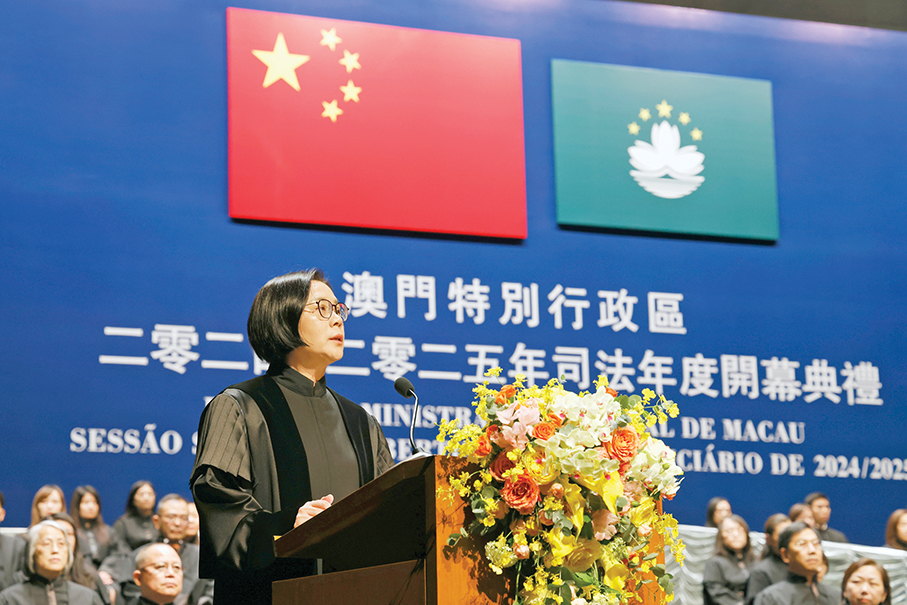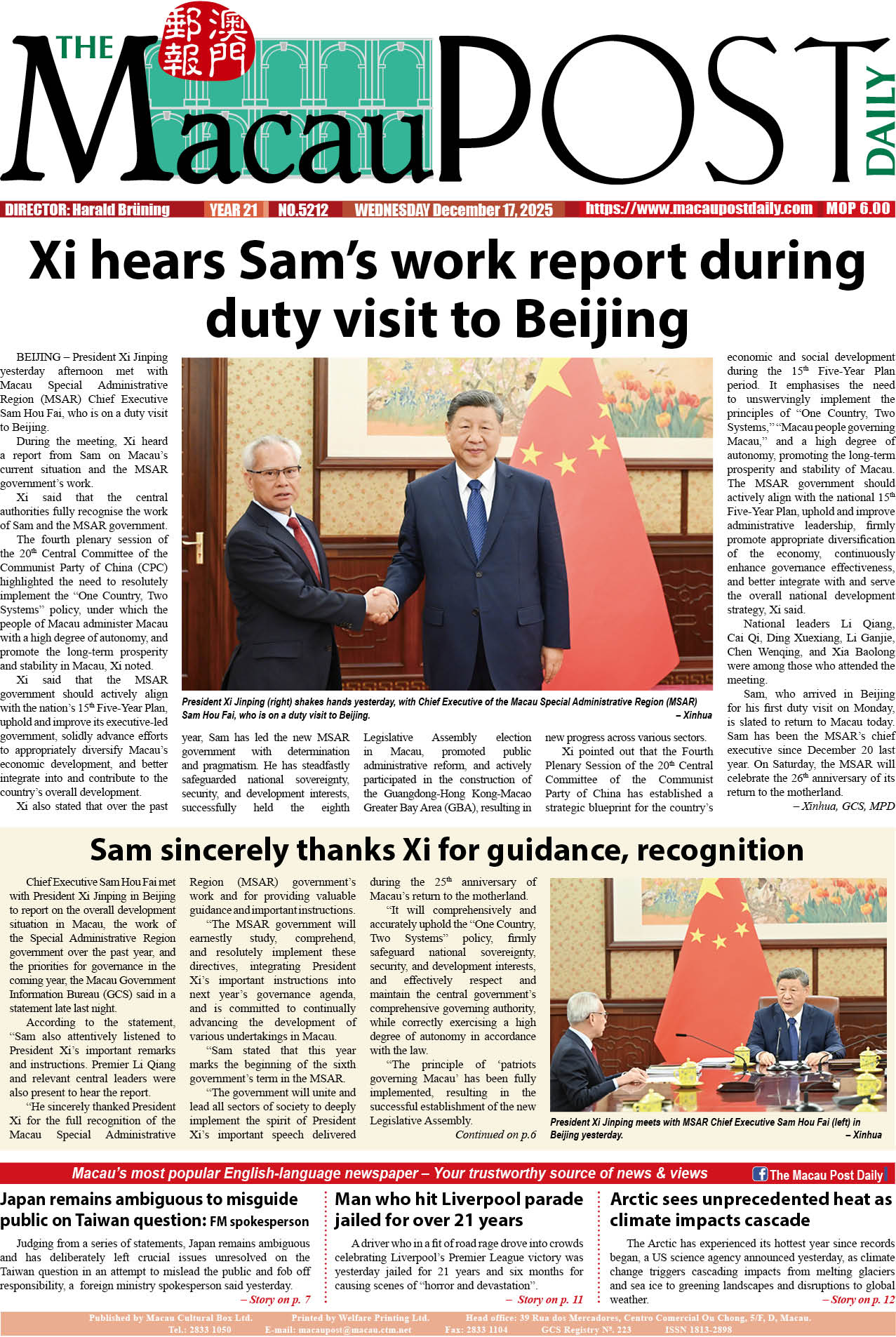The opening ceremony of the new judicial year 2024/2025 was held yesterday at the Macau Cultural Centre in Nape, during which Song Man Lei delivered a speech for the first time in her current capacity as acting president of the Court of Final Appeal (TUI), revealing the local courts’ plans for their future work, including the implementation of a pilot scheme for the appointment of non-permanent judges from Macau to the People’s Court of the Guangdong-Macau In-depth Cooperation Zone in Hengqin, with the aim of setting up a “collective court” together with mainland judges to rule on civil and commercial cases involving Macau.
“Next, we also plan to launch a pilot scheme to appoint Macau judges as non-permanent judges to the People’s Court of the Guangdong-Macau In-depth Cooperation Zone in Hengqin, jointly setting up a collective court with mainland judges to rule on Macau-related civil and commercial cases,” Song said in her speech delivered in Chinese and simultaneously translated into Portuguese.
Song added that the number of requests for judicial assistance between Macau and the mainland, as well as the number of cases in which the parties concerned seek judgments in the mainland has significantly increased. In the past judicial year, according to Song, the Court of Final Appeal received 345 letters rogatory from mainland courts and 127 letters rogatory transferred from Macau to the mainland, a significant increase of 43 percent as compared with the previous judicial year.
Song, who has been the acting president of Macau’s top court since its then president Sam Hou Fai’s resignation in August so that he could run in the chief executive election, also said that the number of cases in which the parties requested mainland judgments increased by 13 cases compared with that of the previous judicial year, a steep surge of 42 percent, mainly involving the fulfilment of pecuniary liabilities and divorce judgments.
Sam was elected Macau’s future chief executive with 98.99 percent of the votes cast by the Chief Executive Election Committee on Sunday. Sam is slated to be sworn in on December 20, when he will become Macau’s sixth-term and fourth chief executive.
Speaking for the first time at the opening ceremony of the judicial year, Song summarised the operation of Macau’s three-tier court system – “the Court of First Instance, the Court of Second Instance and the Court of Final Appeal” – over the past judicial year with the trend of a continuous increase in the number of cases received by the Court of First Instance and the Court of Second Instance, with a total of 19,239 cases reported to all the three courts, an increase of 1,858 cases compared to the previous year.
Song said that an additional Civil Court would be set up to further speed up the hearing of such cases with the aim of reducing the workload of the existing courts and shortening the time for the cases to go to trial so as to ensure timely protection of public interest. With regard to improving the quality of adjudication, realising the efficient operation of litigation proceedings and relieving the pressure on judicial adjudication, Song said: “We will study the mechanism of assistants to the judges of the Court of Final Appeal and the Court of Second Instance,” while also further enhancing the training and management of judges and law clerks through a review and revision of the judicial promotion and training system as well as the additional remuneration system.
In addition to pledging to adhere to the principles of impartiality, efficiency and transparency, Song also said that “we will continue to promote the development and innovation of the courts”, revealing the judiciary’s plan to roll out electronic communications between the courts and other public entities in the first quarter of next year, as well as electronic notification and certification services for the courts.
Song also vowed to continue the “persistent” promotion of using the Chinese language in the courts and for their judgements. She said the aim was to “demystify” the work of the judiciary vis-à-vis Macau’s “common citizens” who are predominantly Chinese.
Chief prosecutor puts forward 3 tasks
Meanwhile, Prosecutor-General Ip Son Sang said in his speech during yesterday’s ceremony that “the Macau Special Administrative Region (MSAR) is about to enter a new process of historical development,” putting forward three tasks to be carried out in accordance with the Public Prosecutions Office’s plans, namely the establishment of a professional team of prosecutors who are patriotic and love Macau; the modernisation of the local legal system; and increasing the implementation of modern technology in the field of justice and the promotion of further progress in the electronic litigation process.
Ip said: “We must accelerate our efforts to adapt to the positioning and requirements of Macau in the Guangdong-Hong Kong-Macau Greater Bay Area (GBA) and Hengqin’s in-depth cooperation zone,” adding that the Public Prosecutions Office (MP) will strengthen liaison with the executive and legislative organs to take forward the legal progress of the arrangement for judicial assistance in criminal matters between Macau and the mainland while, at the same time, taking as reference the scripless litigation mode of operation of the mainland prosecution departments to activate, in a timely manner, the relevant studies and legislative amendments, so as to make corresponding adjustments to the existing judicial litigation system for the promotion of judicial electronic applications in Macau.
Ho says judicial capacity ‘must’ be enhanced
Also addressing the opening ceremony, Chief Executive Ho Iat Seng said that it was a “must” for Macau to enhance its judicial capacity, improve its multi-tiered dispute resolution mechanism and optimise the business environment under the rule of law, providing “stronger” judicial protection for the development of the economy and society.
He also said: “During the current term of the government, we have continued to deepen judicial reform, improve the legal system, enhance the credibility of the law, and listen to the aspirations and voices of every member of the public for fairness and justice,” adding that the government also made great efforts to move forward the judicial work by promoting judicial innovation and information technology and applying new technologies and means to enhance the effectiveness of the judiciary.
Vong: 444 lawyers, 170 trainees
Meanwhile, according to Vong Hin Fai, president of the Macau Lawyers Association (AAM), the number of lawyers registered in the association stands at 444, while the total number of trainee lawyers amounts to 170, of which 84 lawyers are currently working as private notaries and 16 lawyers working as notaries certified by the mainland authorities.
Vong said during the ceremony that the number of local lawyers who have formally registered as GBA lawyers has reached 82 and are practising in the nine mainland cities of the Greater Bay Area.

Song Man Lei, acting president of the Court of Final Appeal (TUI), delivers a speech during yesterday’s opening ceremony of the new judicial year 2024/2025 at the Macau Cultural Centre in Nape. – Photo: GCS







